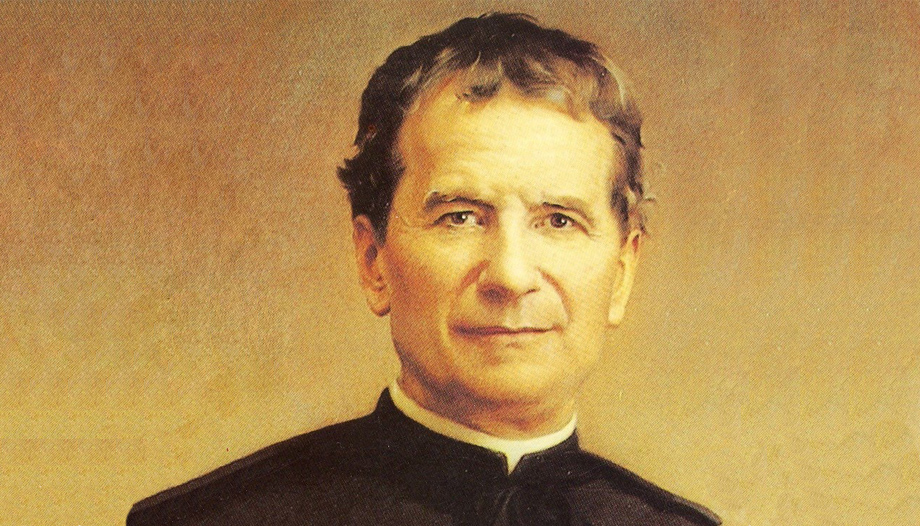Your life
St. John Bosco was born on August 16, 1815 in Castelnuovo d'Asti, a small town near Turin, into a poor and very Christian peasant family. His father died when he was less than two years old, so he was raised exclusively by his saintly mother, Margherita Occhiena.
On October 30, 1835, he entered the Seminary of Chieri. He was ordained a priest on June 5, 1841 in Turin, where he exercised his priestly ministry in prisons, on the streets and in workplaces. He soon gathered around him a group of young people, whom he placed under the patronage of St. Francis de Sales. In 1846 he rented premises in Valdocco, a suburb north of Turin, which constituted the first stable nucleus of his work with young people.
St. John Bosco clearly understood that, when the new industrial world was born, the youth had to be prepared for life, not only morally, but also professionally, so he founded the first professional schools and subsequently numerous other schools. On December 28, 1859, with 17 young people, he founded the Society of St. Francis de Sales, so its members are called "Salesians". Its Constitutions were definitively approved by the Holy See on April 3, 1874. On August 5, 1872, he founded the female branch, the Congregation of the "Daughters of Mary Help of Christians".
He died on January 31, 1888, at the age of 72. He was beatified by Pius XI on June 2, 1929, and canonized by the same Pope on April 1, 1934. On May 24, 1989, he was proclaimed Patron Saint of Youth by St. John Paul II.
His works
St. John Bosco wrote many works, but not systematic treatises, but rather of a pastoral nature, always moved by the circumstances of his life and apostolate. They can be classified into the following genres: pedagogical writings, entertainment, theatrical, hagiographical, biographical, autobiographical, religious instruction, prayer, government documents and epistolary.
His teachings
St. John Bosco was above all a great pedagogue, who advocated in his schools the so-called "preventive system", which consisted in preventing faults, at a time when the educational system was still "repressive", consisting in repressing and punishing the mistakes made by the students.
He was also a great teacher of the spiritual life, which he based on a solid sacramental piety. Frequent reception of the sacraments was an essential element in his pedagogy to lead young people towards holiness, and was the key to his educational project: frequent Communion and Confession, daily Mass.
He taught that frequent Communion is highly recommended, because the Eucharist is both medicine and nourishment for the soul: "Some say that in order to receive Communion frequently, one must be a saint. This is not true. This is a deception. Communion is for those who wish to become saints, not for saints; medicine is given to the sick, nourishment is given to the weak". Communion, therefore, is necessary for all Christians: "All have need of Communion: the good to remain good, the bad to become good: and so, young people, you will acquire the true wisdom that comes from the Lord".
St. John Bosco insisted much on the need for mental prayer. A personal recollection of Blessed Philip Rinaldi, who in 1922 became the Rector Major of the Salesian Society, and who treated his founder during the last years of the latter's life, shows the importance he gave to meditation: "Going to confession with him during the last month of his life, I told him: "You must not tire yourself, you must not speak, I will speak; you will say only one word to me at the end". The good Father, after listening to me, said only one word: Meditation! He added no more, no explanation or comment. Just one word: Meditation! But that word was worth more to me than a long speech."
St. John Bosco's spirituality was eminently Marian. He said that, together with Holy Communion, Mary is the other pillar on which the world rests. He also affirmed: "Mary Most Holy is the foundress and the one who sustains our works". For this reason, he had the image of the Virgin Mary placed in every corner of the Salesian houses, so that she could be invoked and honored as the inspiration and protector of the Salesian Society. He did not hesitate to say and to assure: "The multiplication and spread of the Salesian Society can be said to be due to Mary Most Holy".
St. John Bosco was the apostle of devotion to Mary. Auxilium Christianorumbut he ended up preferring this title to that of Mary Help of Christians. In December 1862 he communicated his decision to build a church in Turin under the patronage of Mary Help of Christians, whose foundation stone was laid on April 27, 1865.
However, on her deathbed it was not the invocation "Auxiliatrix" that came from her lips, but that of "Mother", for she died saying: "In manus tuas, Domine, commendo spiritum meum...Mother...Mother, open to me the gates of Paradise".









